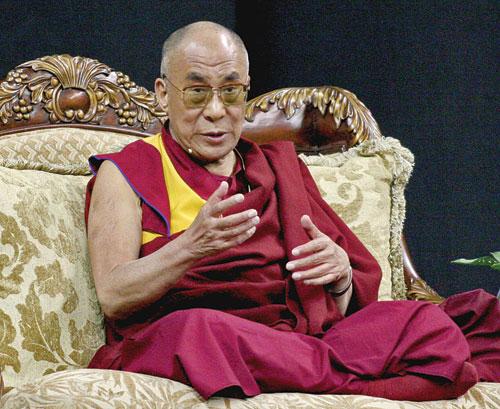The 1989 Nobel Peace Prize winner and exiled Tibetan leader addressed interpersonal relations and the future of mankind with non-violent actions during his 90-minute lecture.
"We have a sort of special connection," the Dalai Lama said of his relationship with the University of Wisconsin, where he has spoken five times since 1981 and received an honorary degree in 1988.
When asked about serious world issues like terrorism, the Dalai Lama took a light approach and used logic to respond with optimism.
"My sense is the desire for peace is very high," the Dalai Lama said. "There are many man-made problems; therefore, we humans have the ability to solve these problems."
Providing his thoughts about happiness, the Dalai Lama talked about the powerful human brain as a source of anxiety due to its complexities.
"We have this unique ability to imagine the future, and with our memory we also have the power of imagination," the Dalai Lama said. "But with no feeling, we'd be just like a robot. That's not good. I prefer a more sophisticated, more colorful life."
The Dalai Lama added that alcohol and drugs only create unnecessary confusion to the situation.
Addressing a more serious topic, the Dalai Lama spoke about the age-old quest for autonomy from communist China since it began its occupation of Tibet in 1951. He specifically addressed the "delicate cultural environment" at risk of being lost.
"We are trying to find a mutual solution," the Dalai Lama said. "We are not seeking independence, but please grant us meaningful autonomy."
The Dalai Lama also spoke about the nature of religion and the common misconception of there being two extremes without love and compassion for those in a secular environment.
"When we encounter situations beyond our capacity, we seek some type of comfort and trust in some higher power," the Dalai Lama said.
When asked about his daily routine, the Dalai Lama joked about his early rise at 3:30 a.m. to meditate, but more importantly to eat a hearty breakfast before fasting from solid food in the afternoon. He also laughed at his daily serious lectures that are often "too long and very boring."
"I spend about four hours meditating, reading, studying and listening to BBC always. That's very important," he said. "Then we always have meetings like this, sometimes they are very useful, sometimes they are a waste of time."
UW senior Ted Piotrowski said he appreciated the presentation's light atmosphere full of jokes and laughter.
"I was just really impressed with what a candid, down-to-earth guy he was. He seemed truly happy," Piotrowski said. "I was expecting something else. We were comparing him to the stoic pope, but he came in and started cracking jokes."
Ben Conrad, a UW freshman who attended the lecture, said the religious acceptance was evident by the Dalai Lama's stance.
"He's a Buddhist, so it's good to hear him talk about things that are found in other faiths and the parallels and that he recognized them as well," Conrad said.








